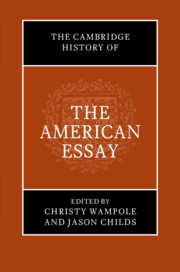Book contents
- The Cambridge History of the American Essay
- The Cambridge History of the American Essay
- Copyright page
- Contents
- Acknowledgments
- Notes on Contributors
- Introduction
- Part I The Emergence of the American Essay (1710–1865)
- Part II Voicing the American Experiment (1865–1945)
- Part III Postwar Essays and Essayism (1945–2000)
- 20 The Essay and the Twentieth-Century Literary Magazine
- 21 Germans in Amerika: Written Possibility, Uninhabitable Reality
- 22 The Essay and the American Left
- 23 The Native American Essay
- 24 Conservatism and the Essay
- 25 Opinions and Decisions: Legal Essays
- 26 World War Two to #MeToo: The Personal and the Political in the American Feminist Essay
- 27 Self-Portraits in a Convex Mirror: The Essay in American Poetry
- 28 The American Essay and (Social) Science
- 29 Philosophy as a Kind of Writing
- 30 The Essay and Literary Postmodernism: Seriousness and Exhaustion
- Part IV Toward the Contemporary American Essay (2000–2020)
- Recommendations for Further Reading
- Index
29 - Philosophy as a Kind of Writing
from Part III - Postwar Essays and Essayism (1945–2000)
Published online by Cambridge University Press: 28 March 2024
- The Cambridge History of the American Essay
- The Cambridge History of the American Essay
- Copyright page
- Contents
- Acknowledgments
- Notes on Contributors
- Introduction
- Part I The Emergence of the American Essay (1710–1865)
- Part II Voicing the American Experiment (1865–1945)
- Part III Postwar Essays and Essayism (1945–2000)
- 20 The Essay and the Twentieth-Century Literary Magazine
- 21 Germans in Amerika: Written Possibility, Uninhabitable Reality
- 22 The Essay and the American Left
- 23 The Native American Essay
- 24 Conservatism and the Essay
- 25 Opinions and Decisions: Legal Essays
- 26 World War Two to #MeToo: The Personal and the Political in the American Feminist Essay
- 27 Self-Portraits in a Convex Mirror: The Essay in American Poetry
- 28 The American Essay and (Social) Science
- 29 Philosophy as a Kind of Writing
- 30 The Essay and Literary Postmodernism: Seriousness and Exhaustion
- Part IV Toward the Contemporary American Essay (2000–2020)
- Recommendations for Further Reading
- Index
Summary
Focusing on the work of Stanley Cavell, Richard Rorty, and Cora Diamond, this chapter shows how twentieth-century academic philosophy in the United States can be characterized in part by an ongoing interest in and exploration of the essay as a philosophical form. In a pluralist spirit, these explorations approach the essay form as a place to rethink and remodel what philosophical argumentation might look like. Related to this work of reimagining, such writing addresses the proximity of philosophy to literature in two senses. First, it is attentive to the potentially literary, written character of philosophy. Second, it is characterized by an interest in taking up works of literature philosophically, as a continuation of philosophical analysis and as a means of immanent criticism precipitating questions about philosophical analysis itself. That the essay became a salient form for these philosophers reflects their methodological radicalism. Each asks questions about philosophy as a kind of writing, and, as Rorty noted, writing tends to come to the foreground in periods of disciplinary crisis or radicalism, when the implicit “stage-setting” of a discipline comes under question.
- Type
- Chapter
- Information
- The Cambridge History of the American Essay , pp. 490 - 508Publisher: Cambridge University PressPrint publication year: 2023

